人教 选修七 Unit4 Sharing 教案
人教版选修7 unit 4 Sharing P1 教学设计

人教版选修7 unit 4 Sharing P1 教学设计人教版选修7unit4sharingp1教学设计第四单元分享period1asamplelessonplanforreading(阿勒特之家)introduction帮助学生理解课文的格式和内容,并学会分享multimediafacilities,tape-recorder,photos,diagramsprocedures1.热身定义志愿者*(mil.)onewhoentersintoservicevoluntarily,butwho,wheninservice,issubjecttodisc iplineandregulationslikeothersoldiers;--opposedtoconscript;specifically,avoluntarymemberoftheorganizedmilitiaofacountr yasdistinguishedfromthestandingarmy.2.pre-readingbygettingtoknowaboutaplacecalledpapuanewguinea你听说过一个叫巴布亚新几内亚的地方吗?现在请阅读图纸和地图。
factsofpapuanewguineacapital:portmoresbygovernment:constitutionalmonarchywithp arliamentarydemocracycurrency:kina(pgk)areatotal:462,840sqkmland:452,860sqkmwa ter:9,980sqkmpopulation:5,172,033(july2002est.)language:englishspokenby1%-2%,pidginenglishwidespread,motuspokeninpapuaregionnote:715indigenouslanguagesr eligion:romancatholic22%,lutheran16%,presbyterian/methodist/londonmissionaryso ciety8%,anglican5%,evangelicalalliance4%,seventh-dayadventist1%,otherprotestant10%,indigenousbeliefs34%3.readingforforms这很可能会让你理解课文中100%的词汇,尤其是一读。
高中英语book7 unit 4 sharing 全单元教案新人教版选修7
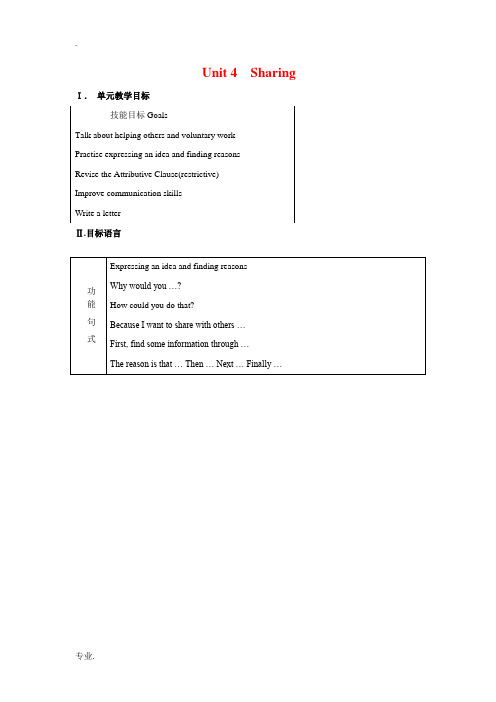
Unit 4 Sharing I.单元教学目标Ⅱ.目标语言III. 教材分析与教材重组1. 教材分析本单元以Sharing为话题,旨在通过单元教学,使学生了解世界上很多地方依然很落后,从而懂得同情,学会分享。
结合针对短文话题的探讨激发学生的国际意识,通过各种渠道力所能及地为贫困地区的孩子做出自己贡献。
1. 1 WARMING UP 提供了三项任务。
通过完成这些任务让学生懂得什么是“帮助〞,并且反思自己是否乐于助人,以及怎样做才是“志愿者〞,由此为后面的短文学习做好铺垫。
1. 2 PRE-READING是READING的热身活动。
其中介绍了短文主人公Jo,还根据她在PNG拍的照片提出了5个问题,使学生在阅读之前就简单了解短文内容。
1. 3 READING是一篇Jo写给Rosemary的信。
其中介绍Jo在PNG(Papua New Guinea)的所见所闻,使学生感受到PNG的儿童生活艰难,从而珍惜自己的学习机会。
.1. 4 COMPREHENDING 是根据短文设计的阅读理解试题。
1. 5 LEARNING ABOUT LANGUAGE分词汇和语法两部分。
其中,第一部分是有关此篇短文中的重点单词和短语;第二部分是有关限定性定语从句的复习。
1. 6 USING LANGUAGE是对READING的延伸。
通过阅读,参与“Give an unusual gift〞的活动。
1. 7 LISTENING AND SPEAKING通过Jennifer Wells的采访介绍了Mary Murray作为MSF的一个volunteer的工作经历,而且针对这一话题展开Speaking。
1. 8 WRITING 根据LISTENING AND SPEAKING话题运用时间表达方式进行写作。
2. 教材重组2.1 从话题内容和训练目的上分析,WARMING UP与LISTENING AND SPEAKING相一致;从教材份量来说,可将WARMING UP与LISTENING AND SPEAKING的1、2、3、4项和Workbook中的LISTENING以及LISTENING TASK整合在一起,设计成一节任务型“听力课〞。
高二英语人教课标选修7Unit4Sharing教案.doc1
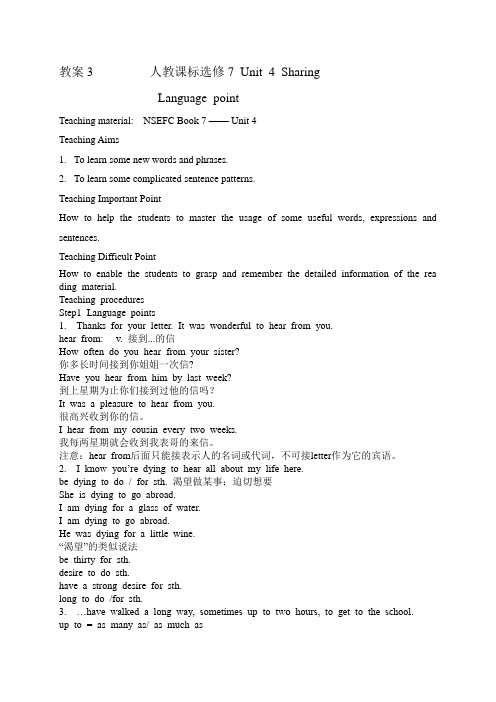
教案3 人教课标选修7 Unit 4 SharingLanguage pointTeaching material: NSEFC Book 7 —— Unit 4Teaching Aims1.To learn some new words and phrases.2.To learn some complicated sentence patterns.Teaching Important PointHow to help the students to master the usage of some useful words, expressions and sentences.Teaching Difficult PointHow to enable the students to grasp and remember the detailed information of the rea ding material.Teaching proceduresStep1 Language points1. Thanks for your letter. It was wonderful to hear from you.hear from: v. 接到...的信How often do you hear from your sister?你多长时间接到你姐姐一次信?Have you hear from him by last week?到上星期为止你们接到过他的信吗?It was a pleasure to hear from you.很高兴收到你的信。
I hear from my cousin every two weeks.我每两星期就会收到我表哥的来信。
注意:hear from后面只能接表示人的名词或代词,不可接letter作为它的宾语。
2. I know you’re dying to hear all about my life here.be dying to do / for sth. 渴望做某事;迫切想要She is dying to go abroad.I am dying for a glass of water.I am dying to go abroad.He was dying for a little wine.“渴望”的类似说法be thirty for sth.desire to do sth.have a strong desire for sth.long to do /for sth.3. …have walked a long way, sometimes up to two hours, to get to the school.up to = as many as/ as much asHe can earn up to $50,000 a year.up to 还可以表示1)be up to sth = be busy doing sth. 忙于2)It is up to sb to do sth 由某人负责做某事3)一直She lived at home right up to / until she got married.What are these naughty boys up to?It is up to me to do this task.I am not sure if she is really up to that job.4. I’m still trying to adapt to these conditions but, one thing is …adapt (oneself) to 适应,适合The new students are very slow to adapt to the rules.新生对于那些规定适应得很慢。
【范文】人教版高中英语选修7教案Unit 4 Sharing
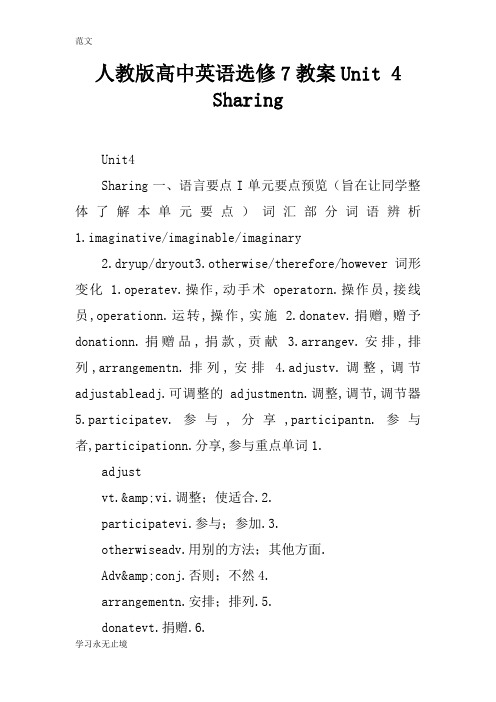
人教版高中英语选修7教案Unit 4SharingUnit4Sharing一、语言要点I单元要点预览(旨在让同学整体了解本单元要点)词汇部分词语辨析1.imaginative/imaginable/imaginary2.dryup/dryout3.otherwise/therefore/however词形变化 1.operatev.操作,动手术operatorn.操作员,接线员,operationn.运转,操作,实施 2.donatev.捐赠,赠予donationn.捐赠品,捐款,贡献 3.arrangev.安排,排列,arrangementn.排列,安排4.adjustv.调整,调节adjustableadj.可调整的adjustmentn.调整,调节,调节器5.participatev.参与,分享,participantn.参与者,participationn.分享,参与重点单词1.adjustvt.&vi.调整;使适合.2.participatevi.参与;参加.3.otherwiseadv.用别的方法;其他方面.Adv&conj.否则;不然4.arrangementn.安排;排列.5.donatevt.捐赠.6.purchasevt.&n.买;购买.7.distributionn.分配;分发;分布状态.8.relevantadj.有关的,相应的9.operatev.操作,运转,开动,起作用重点词组dyingto.极想;渴望.theotherday几天前stickout.伸出inneed.在困难中;在危急中.重点句型1.whenIreachtheschoolgroundstherearelotsof “goodmorning”formefromtheboys.2.youaskedwhetherI’mgettingtoknowanylocalpeople.3.Thegiftcoversthecost ofexercisebooksandtextbooksforcommunityprimaryschoo lsthatoperateinpoororremotevillages.重点语法限制性定语从句II词语辨析1).imaginative/imaginable/imaginaryadj.【解释】imaginative富有想象力的,创新的imaginable可想象得到的imaginary想象中的,虚构的【练习】选择imaginative/imaginable或imaginary并用其适当的形式填空1)Althoughthemaincharactersinthenovelaresotruetolif e,theyare_______.2)It’s_______forsuchan_______writertocreate_______storie s.3)Thisistheonlysolution_________.4)Thefamouspoemwasfroman______poet.keys:1)imaginary2)imaginable;ima ginative;imaginary3)imaginable4)imaginative2).dryup /dryout【解释】dryup使完全变干;(河流,湖泊等)干涸dryout变干,干透【练习】选择dryup或dryout,并用其适当的形式填空1)Thefarmerspumpedwatertotheirfieldstostopthesoil__ ______.2)Thepool________inthelateautumn.3)Thevillag ershadtowaitforthesunto_________thedirtroad.4)Don’tleavethevegetableonthetable,oritwill________.keys: 1)dryingout2)driesup3)dryup4)dryout3)otherwise/ther efore/however【解释】otherwise否则;不然thereforeadv.因此,所以however无论如何,可是【练习】选择otherwise/therefore或however并用其适当的形式填空1)Hedidn'tworkhardatEnglish_______hewouldn'tfinditd ifficulttolearnnow.2)wedonothaveenoughmoney._____ ____wecannotaffordtobuythenewcar.3)Thefirstpartwas easy;thesecond,________,tookhours.4)Heisnoisy,but________aniceboy.5)weweregoingtoplayfootball,butitwassohotthatwedecidedtodo_____________.keys:1 )otherwise2)Therefore3)however4)otherwise5)otherwiseIII词性变化(旨在提供语法填空所需材料)1.operatev.操作,动手术operatorn.操作员,接线员,operationn.运转,操作,实施2.donatev.捐赠,赠予donationn.捐赠品,捐款,贡献 3.arrangev.安排,排列,arrangementn.排列,安排 4.adjustv.调整,调节adjustableadj.可调整的adjustmentn.调整,调节,调节器5.participatev.参与,分享,participantn.参与者,participationn.分享,参与【练习】根据句子结构,用括号内所提供词的适当形式填空1)Theyencouragedthe_______to_______inthesingingperf ormanceafterthecontest..2)Thedoctorare________onan______ofafactorywhogotinjuredwhen_______amachine,and the________issaidtolastovertenhours.3)Theseatsinthe planeare________,andyoucan________themtoacertainang le.The______isnotdifficulttomake.4)Thedrinkswere________tothembycocacolacompanyandtheyreceived_______f romothercompaniesaswell.5)ourdepartmentwillbeinchar geof_______theconference.wouldyoupleasegiveussomesu ggestionsonthe_______forit?keys:1)participants;part icipate2)operating;operator;operating;operation3)ad justable;adjust;adjustment4)donated;donation5)arran ging;arrangementIV重点词汇(旨在提供综合运用所需材料)1.adjustvt.&vi.调整;使适合.[重点用法]adjustmentn.调整;修正adjustableadj.可调节的;可调整的adjust使适应;适应。
人教版高二英语选修七Unit4 Sharing教案设计
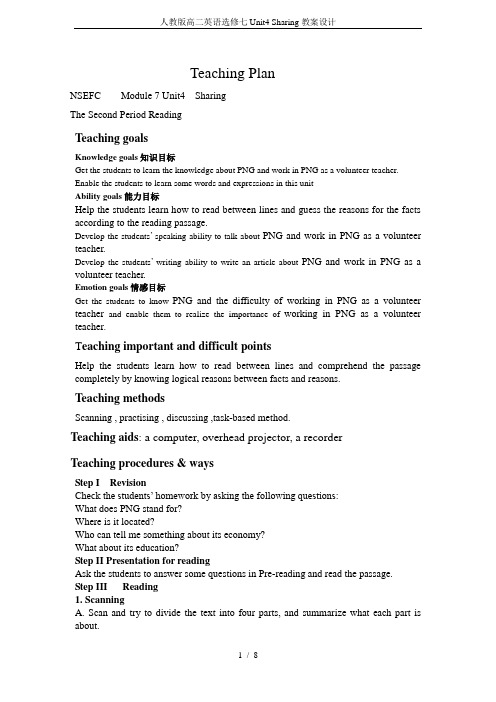
Teaching PlanNSEFC Module 7 Unit4 SharingThe Second Period ReadingTeaching goalsKnowledge goals知识目标Get the students to learn the knowledge about PNG and work in PNG as a volunteer teacher. Enable the students to learn some words and expressions in this unitAbility goals能力目标Help the students learn how to read between lines and guess the reasons for the facts according to the reading passage.Develop the students’ speaking ability to talk about PNG and work in PNG as a volunteer teacher.Develop the students’writing ability to write an article about PNG and work in PNG as a volunteer teacher.Emotion goals情感目标Get the students to know PNG and the difficulty of working in PNG as a volunteer teacher and enable them to realize the importance of working in PNG as a volunteer teacher.T eaching important and difficult pointsHelp the students learn how to read between lines and comprehend the passage completely by knowing logical reasons between facts and reasons.Teaching methodsScanning , practising , discussing ,task-based method.Teaching aids: a computer, overhead projector, a recorderTeaching procedures & waysStep I RevisionCheck the students’ homework by asking the following questions:What does PNG stand for?Where is it located?Who can tell me something about its economy?What about its education?Step II Presentation for readingAsk the students to answer some questions in Pre-reading and read the passage.Step III Reading1. ScanningA. Scan and try to divide the text into four parts, and summarize what each part is about.B. help the students to master the basic forms of a letter writing.2.Careful readingRead paragraphs 2-7 and then do the exercise.Step IV PracticeA.Find words in the passage that have the following meaning.B.Learn the following words or phrases by heart and complete the paragraph.stick out, come across, hear from, platform,(be) dying toStep V Post-readingDeveloping : I. guessingGuess the reasons for the facts according to the reading passage.Developing : II. discussionAsk the students to discuss the following question in group:Why do you think Jo became a volunteer in PNG?(Give as many possible reasons as you can.)Give the students a sample of the discussions :A: I think, first of all, Jo was a kind-hearted woman, who is willing to help others. Second, she knew enough about the poor conditions in PNG and thought that she could help teach in the schools. If I am given the chance, I will do whatever I can to help.B: In my opinion, Jo must have worked as a teacher in Australia, and she applied to become a volunteer abroad, and then she was sent to PNG as a volunteer.C: Maybe she thinks that education is the key to solving all the problems in PNG, so she, as a teacher, goes to PNG to help.Homework1. Finish Exercise 3 on Page 31.2. Read the passage again after class and find all the attributive clauses in it.3.Recite the key sentences in the text.教学流程图:Recite the following phrases and sentences after class:1.stick out 伸出e across 偶然发现或遇到;碰见3.hear from 接到……的信4.(be) dying to 极想;渴望5.in need 在困难中6.adapt (oneself) to 适应,适合7.for sure肯定如此,毫无疑问8.make a difference有关系;起(重要)作用9.dry up(河流,湖泊)干涸;(使)枯竭10.dry out(使)变干;(把)弄干11.adjust to 适应12.in the night在夜间1). I know you’re dying to hear all about my life here.2). I’ve included some photos which will help you picture the places I talk about.3). Tombe’s father, mukap, led us to his house, a low bamboo hut grasssticking out of the roof----this shows it’s a man’s house.4). When I reach the school grounds there are lots of “good mornings”for me from the boys, many of whom have walked a long way, sometimes up to two hours, to get to the school.5). In fact , I wonder if you could post this letter for me.。
人教版高中英语选修7《Unit4Sharing》教案
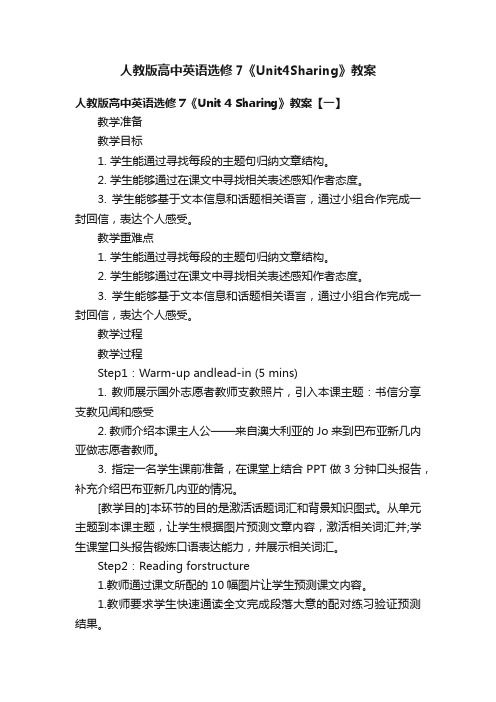
人教版高中英语选修7《Unit4Sharing》教案人教版高中英语选修7《Unit 4 Sharing》教案【一】教学准备教学目标1. 学生能通过寻找每段的主题句归纳文章结构。
2. 学生能够通过在课文中寻找相关表述感知作者态度。
3. 学生能够基于文本信息和话题相关语言,通过小组合作完成一封回信,表达个人感受。
教学重难点1. 学生能通过寻找每段的主题句归纳文章结构。
2. 学生能够通过在课文中寻找相关表述感知作者态度。
3. 学生能够基于文本信息和话题相关语言,通过小组合作完成一封回信,表达个人感受。
教学过程教学过程Step1:Warm-up andlead-in (5 mins)1. 教师展示国外志愿者教师支教照片,引入本课主题:书信分享支教见闻和感受2. 教师介绍本课主人公——来自澳大利亚的Jo来到巴布亚新几内亚做志愿者教师。
3. 指定一名学生课前准备,在课堂上结合PPT做3分钟口头报告,补充介绍巴布亚新几内亚的情况。
[教学目的]本环节的目的是激活话题词汇和背景知识图式。
从单元主题到本课主题,让学生根据图片预测文章内容,激活相关词汇并;学生课堂口头报告锻炼口语表达能力,并展示相关词汇。
Step2:Reading forstructure1.教师通过课文所配的10幅图片让学生预测课文内容。
1.教师要求学生快速通读全文完成段落大意的配对练习验证预测结果。
2.教师引导学生归纳出全文的整体结构。
[教学目的] 本环节的目的是让学生了解文章的整体结构。
不仅让学生学会寻找中心句,而且让学生从每个段落的中心句归纳出课文整体结构,让学生回顾信息交流类书信的写作结构。
Step3:Reading fordetails (10 minutes)1.教师要求学生先同桌配对合作,然后按照学习小组分组合作,仔细阅读文章细节找出信息,完成下列表格(划线部分是学生需要填出的部分):2.教师引导学生根据文章中的相关语言和信息体会作者的感情和态度。
人教版高二英语选修7Unit4Sharing全单元教案

人教版高二英语选修7 Unit 4 Sharing 全单元教案Warming-up and ReadingTeaching Goal:1. Target languagevolunteer, hear from, be dying to, come across, relevant, stick out,doorway, adjust, platform, soft, softly, grill, dry out, dry up, privilege, arrangement2. Ability goalEnable Ss to learn about PNG and Jo’s work in PNG as a volunteer teacher3. Learning ability goalHelp the Ss lean how to read between lines and find the positive andnegative aspects of doing somethingTeaching methods:Discussion, skimming, scanning and task-based methodTeaching AidA recorder, a projector and PPT.Teaching Procedures:Step 1 Warming-upHave you ever helped others? What did you do to help your parents or other relatives? Or your friends? Or people outside your community? I am sureyou’ve a lot to say. OK, now et into gurops and finish the survey formonP28.Step 2 Pre-readingAsk Ss to find out PNG on the map and disucuss the photos in the reading passage.Step3 Reading1. ScanningScanning the text and fill the blanks with their names.1._____ is a young Australian woman.2.________ was dying to hear all about Jo’s life in PNG.3._______ walked a long way to get to school.4.___________ didn’t have any textbook.5._____ became a lot more imaginative when teaching.6._____ started jumping out the windows during achemistry experiment.7.________ v isited a village that was the home o f one the boys, Tombe.8._____ started crying “ieee ieee” to welcome them.9._____ led us to a low bamboo hut.10._____ was going to share the platform with Jenny and Jo.11.________ softly talked to each other in their language Jodidn’t understand2. Skimming the text and find the general idea of each paragraph.3.detailed reading Task-based (ex1 in comprehending part.Type of houseFamily relation-shipsCooking methodsSleeping arrange-mentsType of houseFamily relation-shipsCooking methodsSleeping arrange-mentsStep IV.HomeworkSuppose you've graduated from a key university and now y ou are a volunteer who works in the remote region to assit the basic education there. Andyou are to write a letter home to introduce your present situation. (youcan refer to the text).Extensive ReadingTeaching goals:1. Enable the Ss to know the purpose of a website called“world gifts” and give their opinions on it.2. Enable the Ss to learn about the international welfare programmer called “Plan International” and a child who has been sponsored through it.Teaching important and difficult points:Get the Ss to realize that they should make the most of what they own and do something for the poor.Teaching method:Task-based method and fast readingTeaching aids:A recorder, a projector, a compute connected to the Internet.Teaching procedures:Step I.RevisionDictation eight sentences, each contain the vocabulary they ‘ve learned in this unit.Step II. Pre-reading“Have you ever tried to send a gift to the children in poorareas or countries? Probably not. Today, we can have access to a website, where you can send your gifts to those who are in great need. Please glance quickly at the Internet page on Page 33, and answer the followingquestions.1. What does the page show you?2. Where is the list of gifts?3. In what kind of order are the gifts listed? How much arecheapest and dearest gift?4. where is the gift card?5. What do the photos show you?Step III. Careful ReadingReading carefully.And the task is to finish Ex2 on page 34.Discussing What do you think of this website and its idea? Do you thinkpeople will get interested in it and buy its gifts? Do you think thosegifts listed are really helpful? Now turn to page 34. Discuss the topicsin Ex 3 in groups. Choose one of the topics to discuss.Step IV. Reading TaskDeal with reading task in the work book.We have talked about the Chinese welfare programmer Project Hope whichhelps children in poor areas go back to school. In the world, there aremany organizations or programmers that help different groups of peoplein one way or another. Today, we will get to know another organizationcalled Plan International. Turn to page 73,. This is a letter from Rosannato some students. Rosanna works as a volunteer of Plan International inan area of Ecuador. Why did she write to the Ss? What did the Ss do? Read the letter and find the answers. While reading, summarize the topic ofeach paragraph and finish Ex on page74.Step V. Homework1. Ask Ss to search for information about Plan International.2. Pick out the sentences with attributive clauses in “ A letter from Plan”.WritingTeaching Goal:Enable the Ss to write about a person’s experience by using time expression_r_rEnable the Ss to write a letter to a child they would like to sponsorTeaching important and difficult pointsThe characteristics of narrationTeaching methods:Task-based methodTeaching AidA projector and PPT.Teaching Procedures:Step 1 RevisionCheck the homeworkAsk some S s to read sentences w ith attributive clauses in “ A letter from plan”.Step 2 Pre-writingLet’s recall something about Dr Mary Murray, who worked as a volunteerwith Medicines Sans Frontiers (MSF). Who’d like to say something about her? Let’s try it this way. Each of you is gi ven the chance to say only one sentence about Dr Mary Murray. OK, begin. Of course, you can have an attributive clause in your sentenceDr Mary Murray was a volunteer, who worked with Medicines Sans Frontiers (MSF).Dr Mary Murray once worked in clinic in both Malawi and Sudan which are developing countries in AfricaStep 3 WritingVery good. Now you are asked to write about Dr Murray for the school magazine. Write a paragraph on each topic below in the order shown.Remember to use time expression_r_rs listed on Page 35.Points must be included:1. who she is2. reasons why she joined MSF3. what she did in Malawi4. what she did in the Sudan5. the effects on her of her experiences.6. her plans for the futureStep 4 Writing taskDeal with writing task on Page75.Imagine that you have decided to sponsor Shanshan, a 11-year-old girl from Gansu province. Her family cannot afford to keep her at school. But sheloves practicing English. Write a letter to her in English. In your letter, you can:Introduce yourselfSay something about your interests and hobbiesDescribed your familyLet her know you want to make friend with her and her from herOther things you would like to tell her.After the Ss have finished writing, ask several of them to read theirletters.Sample writing:Dear Shanshan,I’m a student of Guangzhou No.1 senior High School, Guangdong p rovince. My English name is Steve, and I like English very much. Maybe I can helpyou to continue with your school.I go to school everyday except on Sundays. Every morning, we have four lessons, including P.E., arts, music. I like sports very much, especially football .Whenever I’m free I would play football with my classmates.I also enjoy reading English papers, which gives me great delight, andhelps improve my studies.I have a small family. There are father, mother and I. Mum often cooksdelicious food for me. And Dad u sually encourages me t o study hard in order to serve the country and people better. I think so. So I work very hardat my lessons.I’m looking forward to hearing from you. I want to know what you needbadly so that I know what I can do fro you .Don’t hesitate to ask for what you want. I will try to help youYourssincerelySteveStep 5 AssignmentAsk Ss to polish the letter they wrote in class and hand it in tomorrow.。
人教版高中英语选修七教案:Unit+4+Sharing+writing.doc
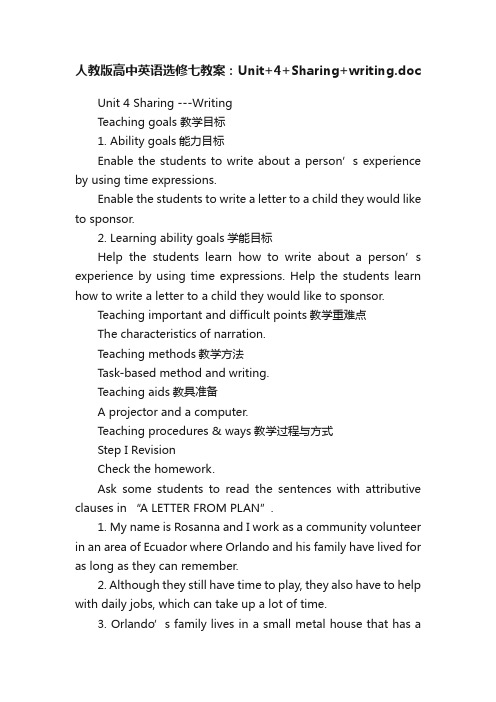
人教版高中英语选修七教案:Unit+4+Sharing+writing.docUnit 4 Sharing ---WritingTeaching goals 教学目标1. Ability goals能力目标Enable the students to write about a person’s experience by using time expressions.Enable the students to write a letter to a child they would like to sponsor.2. Learning ability goals学能目标Help the students learn how to write about a person’s experience by using time expressions. Help the students learn how to write a letter to a child they would like to sponsor.Teaching important and difficult points教学重难点The characteristics of narration.Teaching methods教学方法Task-based method and writing.Teaching aids教具准备A projector and a computer.Teaching procedures & ways教学过程与方式Step I RevisionCheck the homework.Ask some students to read the sentences with attributive clauses in “A LETTER FROM PLAN”.1. My name is Rosanna and I work as a community volunteer in an area of Ecuador where Orlando and his family have lived for as long as they can remember.2. Although they still have time to play, they also have to help with daily jobs, which can take up a lot of time.3. Orlando’s family lives in a small metal house that has astraw roof and a dirt floor.Step Ⅱ Pre-writingT: Let’s reca ll something about Dr Mary Murray, who worked as a volunteer with Medecins Sans Frontieres (MSF). Who’d like to say something about her? Let’s try it this way. Each of you is given the chance to say only one sentence about Dr Mary Murray. OK, begin. Of course, you can have an attributive clause in your sentence.Sa: Dr Mary Murray was a volunteer, who worked with Medecins Sans Frontieres (MSF).Sb: Dr Mary Murray once worked in clinic in both Malawi and Sudan which are developing countries in Africa.…Step Ⅲ WritingT: Very good. Now you are asked to write about Dr Murray for the school magazine. Write a paragraph on each topic below in the order shown. Remember to use time expressions listed on Page 36.1. who she is2. reasons why she joined MSF3. what she did in Malawi4. what she did in the Sudan5. the effects on her of her experiences6. her plans for the futureAfter the students have finished writing, show two samples on the screen and check the mistakes if any.Step Ⅳ Writing taskDeal with WRITING TASK on Page 75.T: Imagine that you have decided to sponsor Shan-shan, a 11-year-old girl from Gansu Province. Her family cannot afford tokeep her at school. But she loves practicing English. Write a letter to her in English. In your letter, you can:Introduce yourselfSay something about your interests and hobbiesDescribe your familyLet her know you want to make friend with her and hear from herOther things you would like to tell herAfter the students have finished writing, ask several of them to read their letters.品味人生1、不管鸟的翅膀多么完美,如果不凭借空气,鸟就永远飞不到高空。
人教版高中英语选修7优秀教案Unit4SharingPeriod 4新
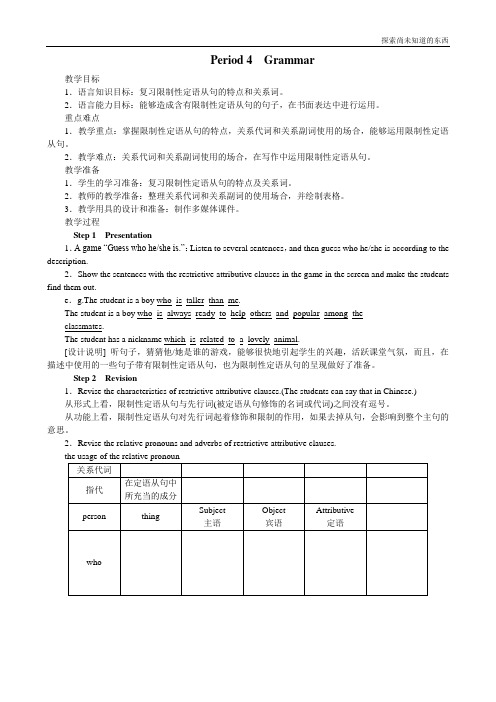
Period 4Grammar教学目标1.语言知识目标:复习限制性定语从句的特点和关系词。
2.语言能力目标:能够造成含有限制性定语从句的句子,在书面表达中进行运用。
重点难点1.教学重点:掌握限制性定语从句的特点,关系代词和关系副词使用的场合,能够运用限制性定语从句。
2.教学难点:关系代词和关系副词使用的场合,在写作中运用限制性定语从句。
教学准备1.学生的学习准备:复习限制性定语从句的特点及关系词。
2.教师的教学准备:整理关系代词和关系副词的使用场合,并绘制表格。
3.教学用具的设计和准备:制作多媒体课件。
教学过程Step 1Presentation1.A game “Guess who he/she is.”:Listen to several sentences,and then guess who he/she is according to the description.2.Show the sentences with the restrictive attributive clauses in the game in the screen and make the students find them out.e.g.The student is a boy who_is_taller_than_me.The student is a boy who_is_always_ready_to_help_others_and_popular_among_the_classmates.The student has a nickname which_is_related_to_a_lovely_animal.[设计说明] 听句子,猜猜他/她是谁的游戏,能够很快地引起学生的兴趣,活跃课堂气氛,而且,在描述中使用的一些句子带有限制性定语从句,也为限制性定语从句的呈现做好了准备。
Step 2Revision1.Revise the characteristics of restrictive attributive clauses.(The students can say that in Chinese.)从形式上看,限制性定语从句与先行词(被定语从句修饰的名词或代词)之间没有逗号。
人教版高中英语选修7教案Unit4Sharing
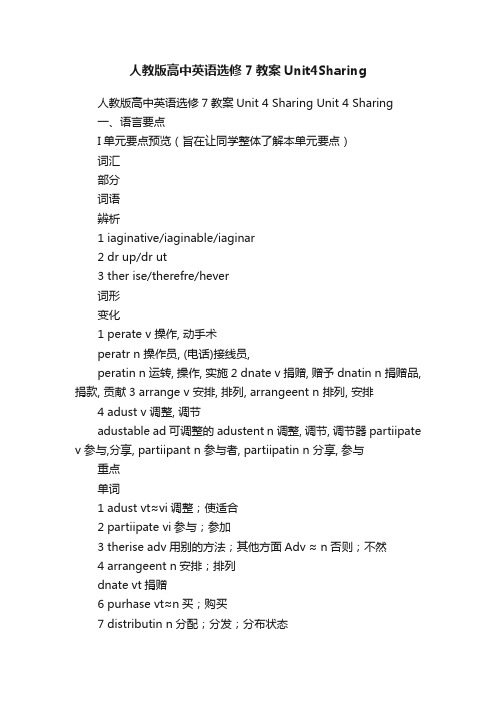
人教版高中英语选修7教案Unit4Sharing人教版高中英语选修7教案Unit 4 Sharing Unit 4 Sharing一、语言要点I单元要点预览(旨在让同学整体了解本单元要点)词汇部分词语辨析1 iaginative/iaginable/iaginar2 dr up/dr ut3 ther ise/therefre/hever词形变化1 perate v 操作, 动手术peratr n 操作员, (电话)接线员,peratin n 运转, 操作, 实施2 dnate v 捐赠, 赠予dnatin n 捐赠品, 捐款, 贡献3 arrange v 安排, 排列, arrangeent n 排列, 安排4 adust v 调整, 调节adustable ad可调整的adustent n 调整, 调节, 调节器partiipate v 参与,分享, partiipant n 参与者, partiipatin n 分享, 参与重点单词1 adust vt≈vi调整;使适合2 partiipate vi参与;参加3 therise adv用别的方法;其他方面Adv ≈ n否则;不然4 arrangeent n安排;排列dnate vt捐赠6 purhase vt≈n买;购买7 distributin n分配;分发;分布状态8 relevant ad 有关的, 相应的9 perate v 操作, 运转, 开动, 起作用重点词组(be) ding t 极想;渴望the ther da 几天前sti ut 伸出in need 在困难中;在危急中重点句型1 hen I reah the shl grunds there are lts f “gd rning” fr e fr the bs2 u ased hether I’getting t n an lal peple3 The gift vers the st f exerise bs and textbs fr unit priar shls that perate inpr r rete villages重点语法限制性定语从句(见语法专题)II 词语辨析(旨在提供完形填空所需材料) 1) iaginative/iaginable/iaginar ad【解释】iaginative富有想象力的,创新的iaginable可想象得到的iaginar想象中的,虚构的【练习】选择iaginative/iaginable或iaginar并用其适当的形式填空1) Althugh the ain haraters in the nvel are s true t life, the are _______2) It’s _______ fr suh an _______ riter t reate _______ stries3) This is the nl slutin _________4) The faus pe as fr an ______ petes: 1) iaginar 2) iaginable; iaginative ; iaginar 3) iaginable 4) iaginative。
人教版高中英语选修7教案Unit 4 Sharing

人教版高中英语选修7教案Unit 4SharingUnit4Sharing一、语言要点I单元要点预览(旨在让同学整体了解本单元要点)词汇部分词语辨析1.imaginative/imaginable/imaginary2.dryup/dryout3.otherwise/therefore/however词形变化 1.operatev.操作,动手术operatorn.操作员,接线员,operationn.运转,操作,实施 2.donatev.捐赠,赠予donationn.捐赠品,捐款,贡献 3.arrangev.安排,排列,arrangementn.排列,安排4.adjustv.调整,调节adjustableadj.可调整的adjustmentn.调整,调节,调节器5.participatev.参与,分享,participantn.参与者,participationn.分享,参与重点单词1.adjustvt.&vi.调整;使适合.2.participatevi.参与;参加.3.otherwiseadv.用别的方法;其他方面.Adv&conj.否则;不然4.arrangementn.安排;排列.5.donatevt.捐赠.6.purchasevt.&n.买;购买.7.distributionn.分配;分发;分布状态.8.relevantadj.有关的,相应的9.operatev.操作,运转,开动,起作用重点词组dyingto.极想;渴望.theotherday几天前stickout.伸出inneed.在困难中;在危急中.重点句型1.whenIreachtheschoolgroundstherearelotsof “goodmorning”formefromtheboys.2.youaskedwhetherI’mgettingtoknowanylocalpeople.3.Thegiftcoversthecost ofexercisebooksandtextbooksforcommunityprimaryschoo lsthatoperateinpoororremotevillages.重点语法限制性定语从句II词语辨析1).imaginative/imaginable/imaginaryadj.【解释】imaginative富有想象力的,创新的imaginable可想象得到的imaginary想象中的,虚构的【练习】选择imaginative/imaginable或imaginary并用其适当的形式填空1)Althoughthemaincharactersinthenovelaresotruetolif e,theyare_______.2)It’s_______forsuchan_______writertocreate_______storie s.3)Thisistheonlysolution_________.4)Thefamouspoemwasfroman______poet.keys:1)imaginary2)imaginable;ima ginative;imaginary3)imaginable4)imaginative2).dryup /dryout【解释】dryup使完全变干;(河流,湖泊等)干涸dryout变干,干透【练习】选择dryup或dryout,并用其适当的形式填空1)Thefarmerspumpedwatertotheirfieldstostopthesoil__ ______.2)Thepool________inthelateautumn.3)Thevillag ershadtowaitforthesunto_________thedirtroad.4)Don’tleavethevegetableonthetable,oritwill________.keys: 1)dryingout2)driesup3)dryup4)dryout3)otherwise/ther efore/however【解释】otherwise否则;不然thereforeadv.因此,所以however无论如何,可是【练习】选择otherwise/therefore或however并用其适当的形式填空1)Hedidn'tworkhardatEnglish_______hewouldn'tfinditd ifficulttolearnnow.2)wedonothaveenoughmoney._____ ____wecannotaffordtobuythenewcar.3)Thefirstpartwas easy;thesecond,________,tookhours.4)Heisnoisy,but________aniceboy.5)weweregoingtoplayfootball,butitwassohotthatwedecidedtodo_____________.keys:1 )otherwise2)Therefore3)however4)otherwise5)otherwiseIII词性变化(旨在提供语法填空所需材料)1.operatev.操作,动手术operatorn.操作员,接线员,operationn.运转,操作,实施2.donatev.捐赠,赠予donationn.捐赠品,捐款,贡献 3.arrangev.安排,排列,arrangementn.排列,安排 4.adjustv.调整,调节adjustableadj.可调整的adjustmentn.调整,调节,调节器5.participatev.参与,分享,participantn.参与者,participationn.分享,参与【练习】根据句子结构,用括号内所提供词的适当形式填空1)Theyencouragedthe_______to_______inthesingingperf ormanceafterthecontest..2)Thedoctorare________onan______ofafactorywhogotinjuredwhen_______amachine,and the________issaidtolastovertenhours.3)Theseatsinthe planeare________,andyoucan________themtoacertainang le.The______isnotdifficulttomake.4)Thedrinkswere________tothembycocacolacompanyandtheyreceived_______f romothercompaniesaswell.5)ourdepartmentwillbeinchar geof_______theconference.wouldyoupleasegiveussomesu ggestionsonthe_______forit?keys:1)participants;part icipate2)operating;operator;operating;operation3)ad justable;adjust;adjustment4)donated;donation5)arran ging;arrangementIV重点词汇(旨在提供综合运用所需材料)1.adjustvt.&vi.调整;使适合.[重点用法]adjustmentn.调整;修正adjustableadj.可调节的;可调整的adjust使适应;适应。
英语高二年级人教版新课标选修7Unit4Sharing教案
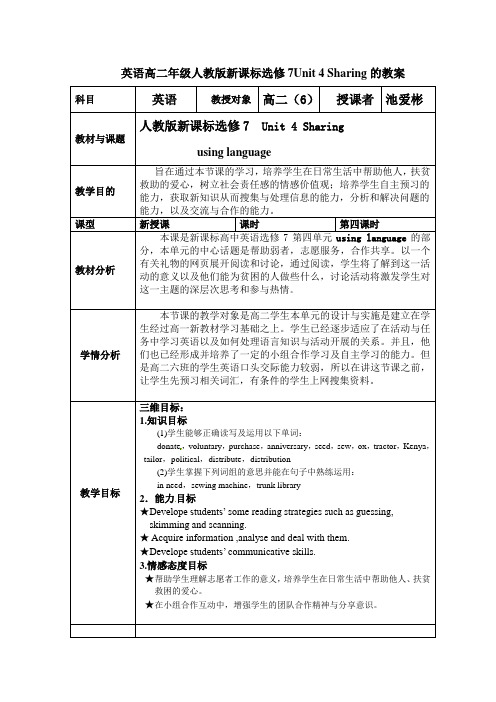
英语高二年级人教版新课标选修7Unit 4 Sharing的教案科目英语教授对象高二(6)授课者池爱彬教材与课题人教版新课标选修7Unit 4 Sharingusing language教学目的旨在通过本节课的学习,培养学生在日常生活中帮助他人,扶贫救助的爱心,树立社会责任感的情感价值观;培养学生自主预习的能力,获取新知识从而搜集与处理信息的能力,分析和解决问题的能力,以及交流与合作的能力。
课型新授课课时第四课时教材分析本课是新课标高中英语选修7第四单元using language的部分,本单元的中心话题是帮助弱者,志愿服务,合作共享。
以一个有关礼物的网页展开阅读和讨论,通过阅读,学生将了解到这一活动的意义以及他们能为贫困的人做些什么,讨论活动将激发学生对这一主题的深层次思考和参与热情。
学情分析本节课的教学对象是高二学生本单元的设计与实施是建立在学生经过高一新教材学习基础之上。
学生已经逐步适应了在活动与任务中学习英语以及如何处理语言知识与活动开展的关系。
并且,他们也已经形成并培养了一定的小组合作学习及自主学习的能力。
但是高二六班的学生英语口头交际能力较弱,所以在讲这节课之前,让学生先预习相关词汇,有条件的学生上网搜集资料。
教学目标三维目标:1.知识目标(1)学生能够正确读写及运用以下单词:donate,voluntary,purchase,anniversary,seed,sew,ox,tractor,Kenya,tailor,political,distribute,distribution(2)学生掌握下列词组的意思并能在句子中熟练运用:in need,sewing machine,trunk library2.能力目标★D evelope students’ some reading strategies such as guessing, skimming and scanning.★ Acquire information ,analyse and deal with them.★Develope students’ communicative skills.3.情感态度目标★帮助学生理解志愿者工作的意义,培养学生在日常生活中帮助他人、扶贫救困的爱心。
人教版高中英语选修7优秀教案Unit4SharingPeriod 3新

Period 3Pre-reading and Reading教学目标1.语言知识目标:(1)学生能够正确读写及运用以下单词:airmail;fortnight;roof;muddy;textbook;concept;weekly;relevant;remote;weed;rectangle;rectangular;adjust;platform;broom;tin;jar;sniff;participate;interpreter;grill;otherwise;privilege(2)学生掌握下列词组的意思并能在句子中熟练运用:hear from;(be)dying to;the other day;dry out;dry up2.语言技能目标:(1)强化略读、查读等阅读技能,训练通过寻找关键词、主题句等方式更快速并准确地确定文章的段落大意,理清文章的总体框架与脉络的技能。
(2)继续运用已经掌握的基本猜词技巧猜测文章中的部分单词。
3.语言能力目标:增强阅读理解能力;发展借助图片、表格等非语言信息进行语言输出的能力。
4.情感态度与文化意识目标:(1)帮助学生理解志愿者工作的意义,培养学生在日常生活中帮助他人、扶贫救困的爱心。
(2)在小组合作互动中,增强学生的团队合作精神与分享意识。
重点难点1.教学重点:a.获取巴布亚新几内亚独立国各部落生活状况和风俗习惯的信息;b.阅读能力的培养和阅读技巧的训练,如精读课文完成表格填空等。
2.教学难点:a.理解作为志愿者工作的意义,从而树立正确的价值观;b.训练用英语获取信息、处理信息、分析问题和解决问题的能力。
课前准备1.学生的学习准备查找关于巴布亚新几内亚独立国的信息。
学生可以通过上网等形式搜集信息,并且把搜集到的信息编成问题或写成一段文字,在课堂上向其他同学汇报。
这提高了学生的学习兴趣,把被动的学习变成主动的学习。
2.教师的教学准备查找关于国内外关于帮助他人的个人和组织。
人教版高中英语选修7Unit 4Sharing教案6

Unit 4 SharingThe second period Extensive Reading Teaching goals:1.Enable the Ss to know the purpose of a website called“world gifts” and give their opinions on it. 2.Enable the Ss to learn about the internationalwelfare programmer called “Plan International”and a child who has been sponsored through it. Teaching important and difficult points:Get the Ss to realize that they should make the most of what they own and do something for the poor. Teaching method:Task-based method and fast readingTeaching aids:A recorder, a projector, a compute connected to the Internet.Teaching procedures:Step I. RevisionDictation eight sentences, each contain the vocabulary they ‘ve learned in this unit.Step II. Pre-reading“Have you ever tried to send a gift to thechildren in poor areas or countries? Probably not. Today, we can have access to a website, where you can send your gifts to those who are in great need. Please glance quickly at the Internet page on Page 33, and answer the following questions.1.What does the page show you?2.Where is the list of gifts?3.In what kind of order are the gifts listed? How muchare cheapest and dearest gift?4.where is the gift card?5.What do the photos show you?Step III. Careful ReadingReading carefully.And the task is to finish Ex2 on page 34.Discussing What do you think of this website and its idea? Do you think people will get interested in it and buy its gifts? Do you think those gifts listed are really helpful? Now turn to page 34. Discuss the topics in Ex 3 in groups. Choose one of the topics to discuss.Step IV. Reading TaskDeal with reading task in the work book.We have talked about the Chinese welfare programmer Project Hope which helps children in poor areas go back to school. In the world, there are many organizations or programmers that help different groups of people in one way or another. Today, we will get to know another organization called Plan International. Turn to page 73,. This is a letter from Rosanna to some students. Rosanna works as a volunteer of Plan International in an area of Ecuador. Why did she write to the Ss? What did the Ss do? Read the letter and find the answers. While reading, summarize the topic of each paragraph and finish Ex on page74.Step V. Homework1.Ask Ss to search for information about PlanInternational.2.Pick out the sentences with attributive clauses in“ A letter from Plan”.。
- 1、下载文档前请自行甄别文档内容的完整性,平台不提供额外的编辑、内容补充、找答案等附加服务。
- 2、"仅部分预览"的文档,不可在线预览部分如存在完整性等问题,可反馈申请退款(可完整预览的文档不适用该条件!)。
- 3、如文档侵犯您的权益,请联系客服反馈,我们会尽快为您处理(人工客服工作时间:9:00-18:30)。
BOOK 7 Unit4 Sharing重点词汇与短语:relevant adjust purchase participate donate voluntary otherwise dying to come across stick out in need dry out the other day重点句型:It is/was+ adj./ n. +(for sb. )+to do…重点词汇relevant【原句回放】Sometimes I wonder how relevant chemistry is to the kids||,most of whom will be going back to their villages after year 8. (Page 29)【点拨】relevant:adj. connected with the subject or be connected with有关的; 恰当的||,贴切的||,切题的常用搭配:be relevant to1)His nationality is not relevant to whether he is a good lawyer.他的国籍与是否是个好律师无关||。
2)This type of university course is no longer relevant to today’s problem.这种大学课程与目前问题不再有关联了||。
【拓展】relevance 用作名词||,也可以说relevancy;其反义词是ir relevant;adjust 【原句回放】The hut was dark inside||,so it took time for our eyes to adjust. (Page 30)【点拨】adjust vt. to change slightly to make suitable for a particular job or new conditions.调整;调节;使适合;使适应;相关短语:adjust oneself to sth./ doing sth. … 使自己适应于……【拓展】形容词:adjustable 名词:adjustmentmake an adjustment 做出调整||。
purchase【原句回放】When you purchase an item||,we’ll send you an attractive card for you to send to your special person. (Page 34)【点拨】purchase vt. to buy or to gain sth at the cost of effort||,suffering or sth else 购买; (以某种代价)换得;(经过努力)取得||,赢得(常与with连用)1)It will cost almost all the money for an old couple to purchase a house now.现在一对老夫妻要买一幢房子要花掉几乎所有的钱||。
2)They purchased life at the expense of honour. 他们用荣誉换取了生命||。
【拓展】purchase作名词||,指“购买; 购得物”||。
participate【原句回放】I loved listening to the family softly talking to each other in their language||,even though I could not participate. (Page 30)【点拨】participate vi. to take part or have a share in an activity or event参与||,参加;分享||,分担经常与in连用||。
1)Everyone in the class is expected to participate in these discussions.班里每个人都想参加这些讨论||。
2)I will participate in your suffering and joy. 我将和你同甘共苦||。
【拓展】participant n.表示“参与者||,分享者”;participation n.表示“参与||,分享”otherwise【原句回放】Otherwise they don’t waste anything.(Page 30)【点拨】otherwise adv. differently or in the other way; if not; 用别的方法;其他方面;否则;We were going to play football||,but it was so hot that we decided to do otherwise.(用别的方法)1)He is noisy||,but otherwise a nice boy. (其他方面)2)We’ll go early||,otherwise we may not get a seat. (否则)【拓展】or otherwise或用其他方式;或不是;或相反voluntary【原句回放】The gift you give is not something your loved one keeps but a voluntary contribution towards the lives of people who really need it. (Page 34)【点拨】voluntary adj.自愿的||,志愿的||,无偿的1)When she retired she did a lot of voluntary work for the Red Cross.她退休后为红十字会做了许多义务工作||。
【拓展】volunteer n. 志愿者;v. 自愿或无偿地给予帮助相关短语:volunteer to do sth. 自愿/志愿做某事donate【原句回放】Would you like to donate an unusual gift? (Page 34)【点拨】donate vt. to make a gift of sth. for a good purpose 捐赠||,如:1)The businessman donated a lot of money to the hospital.这个商人想那家医院捐了很多的钱||。
2)This computer was donated to us by a local company.这台计算机是当地一家公司捐赠给我们的||。
【拓展】donation n.捐赠、捐赠物相关短语:give/ make/ present a donation to 捐赠重点短语:hear from【原句回放】It was wonderful to hear from you. (Page 29)【点拨】hear from sb.收到......的来信Not having heard from him for months||,his mother was worried.几个月没有收到他的来信了||,他妈妈很担心||。
【拓展】hear about 听说......的事hear of ①听说(主要用于否定句及疑问句);②听从(与will||,would连用||,用于否定句)1)Have you heard about the new anticancer drug? 你听说过这种抗癌新药吗?2)I’ve never heard of such a person. 我从没有听说这样一个人||。
3)He wouldn’t hear of me paying for the bill. 我要付账||,他不肯||。
the other day【原句回放】The other day I was showing the boys the weekly chemistry experiment when||,before I knew it||,the mixture was bubbling over everywhere.(Page 29)【点拨】the other day前几天||,不久前的一天It was a terrible piece of work that you turned in the other day. 那天你交的作业太糟糕了||。
【拓展】有day的几个短语:①another day另一天||,例:The shop is closed today so we’ll come another day.商店今天关门||,所以我们改日再来||。
Another day dragged by. 又挨过了一天||。
be dying to【原句回放】I know you’re dying to hear all about my life here. (Page 29)【点拨】be dying to do sth.相当于be eager to do sth.||,long to do sth. 极想/ 渴望做某事be dying for sth.相当于long for sth. (口语) 渴望/很想某物All of us are dying to see the film after hearing about it.听说这部电影后||,我们都极想看||。
He was dying for something to drink. 他极想有点什么喝的||。
【拓展】由动词die构成的短语:die away 逐渐停止||,逐渐消失die down逐渐减弱||,逐渐模糊;die off 相继死去die out逐渐消失; 灭绝come across【原句回放】The boys had never come across anything like this and started jumping out of the window. (Page 29)【点拨】come across:meet or discover by chance||,偶然遇到或发现||,碰见||。
有时也表示“受欢迎||,发生效果”||。
1)She came across some old letters in the course of her search.她搜查时发现了一些旧信||。
